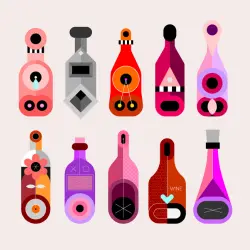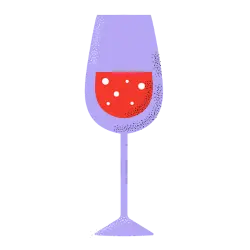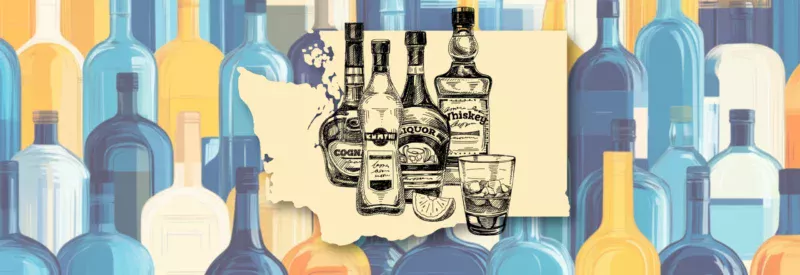
The alcohol industry is a significant revenue source for many Washington bars, restaurants, and entertainment venues. But Washington state officials are heavy-handed when it comes to alcohol regulation, making it challenging for some businesses to sell alcoholic drinks. In recent years, attempts have been made to lower the DUI limit to 0.5% BAC, indicating Washington officials may have an appetite for further restrictions on the beer, wine, and liquor industries. [1]OPB News. “Washington state lawmakers consider lower threshold for DUI charges as road deaths continue to rise.” Accessed September 19, 2024.
Understanding how to apply for liquor licenses and abide by Washington liquor laws is essential for business owners offering alcoholic beverages. Since there are quite a few steps to this process, starting the application process on the right foot can help your business avoid delays in the approval process.
This guide explores types of liquor licenses in Washington, how to get one, how to renew, and other related topics.
Types of Washington Liquor Licenses
For businesses, Washington offers various liquor licensing types, including retailers, manufacturers, wholesalers, and others selling or distributing liquor licenses. The state divides the licenses into two primary categories: retailers and non-retailers. For the purpose of this guide, we will focus mainly on retail license types. Now, let’s explore the most popular retail liquor licenses below:
Restaurant (Beer and/or Wine)
This license type allows for the sale of beer and wine for on-premises consumption, provided the restaurant offers a minimum food service.
Restaurant (Spirits, Beer, and Wine)
For restaurants that want to sell liquor, this license type allows the sale of liquor, beer, and wine for on-premises consumption. However, this license has additional requirements in terms of food service, kitchen equipment, and premises size.
Spirits Retailer
This license type allows a business to sell spirits in original containers for off-premises consumption. The premises must be at least 10,000 square feet and fully enclosed. A further permit is required if the business wants to sell alcohol to other retailers.
Nightclub
This license type allows nightclubs to sell beer, wine, and liquor for on-premises consumption. The nightclub’s primary business hours must be between 9:00 PM and 2:00 AM.
Hotel
This license type allows hotels with at least 20 rooms to sell alcohol both off-premises and on-premises.
Grocery Store
This license type allows grocery stores to sell beer and wine (there’s another license for liquor) for off-premises consumption. The grocery store must maintain a minimum of $3,000 worth of food products (not including beer, wine, or soft drinks).

Other types of retail licenses
While the previously mentioned licenses are some of the most popular liquor permits in Washington, there are plenty of other options for niche businesses in the alcohol sector. Check out some of the other retail liquor license types available:
| Beer and/or Wine Gift Delivery | Combination Spirits / Beer / Wine Off-Premises Retail License — Grocery Store Beer and/or Wine Specialty Shop |
| Combination Spirits / Beer / Wine Off-Premises Retail License — Specialty Shop | Beer and/or Wine Theatre |
| Beer and/or Wine Theatre | Liquor Caterer |
| Motel | Nonprofit Arts Organization |
| Private Club — Beer and Wine | Private Club — Spirits, Beer, and Wine |
| Public House | Senior Center |
| Snack Bar | Spirits / Beer / Wine Theater |
| Spirits Retailer | VIP Airport Lounge |
| Sports Entertainment Facility | Other |

What type of liquor license do I need?
The Washington alcohol license your business requires depends on your industry, size, and type of alcohol you wish to sell. Make sure to explore all the retail business licenses available before deciding which one is appropriate for your business.
Remember, the liquor licenses mentioned so far are only for retailers. Wholesalers, distributors, and other alcohol-industry businesses require separate licenses.
Liquor License Requirements for Washington
Washington has extensive liquor licensing requirements. In addition to providing details about yourself, other shareholders, and your business, you must also provide the following documentation during the application:
- Business structure
- Financing and start-up costs
- Lease or purchase agreements
- Floor plans
- Personal/criminal history statement
While Washington doesn’t require you to submit finalized leases and purchase agreements if you’re still negotiating contracts, the agreements must be finalized before a license is approved.

Other necessary permits
Washington also offers “Endorsements,” which are additional permits that allow the modification of an existing license. For example, if you own a grocery store that wants to offer wine tasting, there’s an Endorsement available to enable this.
Your business may require other permits depending on where in Washington it is located. Always check with local municipalities to determine if you need additional licenses or permits to conduct business.
Understanding Liquor Laws in Washington
Washington liquor license applicants must undertake an online briefing of liquor laws during the application process. This ensures liquor license holders know how to operate legally in the state. Now, let’s explore some examples of Washington liquor laws:
- No sales outside 6:00 AM to 9:00 AM
- Required signage must be displayed (such as pregnancy warnings, etc.)
- Businesses cannot refuse entry to law enforcement
- Individuals under the age of 21 cannot be served alcohol
- Managers, servers, and bartenders must have an alcohol-serving permit
- A Master Business License must be clearly posted on the wall
- A licensed premises is responsible for the safety of individuals at the establishment
- Individuals cannot be served alcohol if they are intoxicated
You can find links to the full legal briefings online.
How Much Does a Liquor License Cost in Washington?
So, how much is a liquor license in Washington? Liquor licenses in Washington aren’t cheap, but they’re more affordable than in many other states. The cost varies depending on the license type and the type of alcohol your business sells. Generally, if you want to sell spirits, it’s more expensive than just selling beer and wine. Let’s explore prices for retail liquor licenses in Washington:
| Restaurant (Beer and/or Wine): $200 – $400 | Restaurant (Spirits, Beer, and Wine): $1,000 – $2,600 |
| Spirits Retailer: $166 | Nightclub: $2,000 |
| Hotel: $2,000 | Grocery Store: $150 |
| Beer and/or Wine Gift Delivery: $75 | Beer and/or Wine Specialty Shop: $100 |
| Combination Spirits / Beer / Wine Off-Premises Retail License — Specialty Shop: $316 | Beer and/or Wine Theater: $400 |
| Liquor Caterer: $200 – $1,000 | Motel: $500 |
| Nonprofit Arts Organization: $250 | Private Club — Beer and Wine: $180 |
| Private Club — Spirits, Beer, and Wine: $720 | Public House: $1,000 |
| Senior Center: $720 | Snack Bar: $125 |
| Spirits / Beer / Wine Theater: $2,000 | Spirits Retailer: $166 |
| Sports Entertainment Facility: $2,500 | VIP Airport Lounge: $2,000 |
How to Apply for a Liquor License in Washington
The Washington State Liquor and Cannabis Board considers applications for businesses ready to begin selling alcohol within three months, so make sure you apply at least 90 days before your planned opening date. Below, let’s explore a step-by-step guide for applying for a Washington liquor license:

Step 1: Apply online
Start by heading to the Department of Revenue (DOR) Washington State website and applying for a license. You must create an account on the DOR platform before accessing the application.
Step 2: A Licensing Specialist contacts your business
All applicant businesses are assigned a Licensing Specialist. They’ll contact you within a week of receiving your application to explain the next steps.
Step 3: Telephone interview
The Licensing Specialist will schedule an interview with you to discuss your business plan, business partners, and other critical details. Having a formal business plan makes this conversation much more manageable.
Step 4: Submit additional documents
Next, it’s time to submit your additional documents to your Licensing Specialist. These include:
- Business structure
- Financing and start-up costs
- Lease or purchase agreements
- Floor plans
- Personal/criminal history statement
Step 5: Post local notifications
Then, while your documents undergo inspection, the Washington State Liquor and Cannabis Board will notify your local authorities, as well as nearby churches and schools. Stakeholders may support or object to your application.
Step 6: Document review
Your Licensing Specialist will continue to review your documents. They’ll reach out if they require any clarification. Respond promptly to avoid delays.
Step 7: Personal/criminal history statement
Next, for those without an existing liquor license, the Washington State Liquor and Cannabis Board requires a Personal/Criminal History Statement. You must disclose all criminal history details, including charges that were changed, deferred, dismissed, or occurred when you were a juvenile.
Step 8: Undergo a final inspection
Retail license applicants must undertake an online briefing on Washington liquor laws. Likewise, they must collect and submit photos of the premises for a final inspection.
Step 9: Receive a licensing decision
Lastly, it’s time to receive your licensing decision. If approved, your approval letter serves as your license for 30 days until you receive all your finalized documentation, such as your Master Business License.
How to Renew Your Washington Liquor License
While the application process for a new liquor license is a complex, time-consuming process, renewing a license is much simpler. You have two options: log into the Department of Revenue (DOR) Washington State website and renew your license, or submit the paper renewal application you receive with your renewal notice. All paper renewals can be mailed here:
State of Washington
Business Licensing Service
P.O. Box 9034
Olympia, WA 98507-9034
Getting a Beer and Wine License in Washington: Closing Thoughts
Washington businesses face a long application process before being granted permission to sell liquor, beer, and wine in the state. Starting the application process as soon as possible and responding to requests for additional information quickly is essential if you have immediate plans to open a business in the alcohol sector. However, while the hurdles may feel significant, obtaining a Washington liquor license offers access to more than 4.1 million customers over the age of 21.[2]Infoplease. “WA Demographic Statistics.” Accessed September 19, 2024.
Whether you’re running a restaurant, bar, nightclub, catering company, grocery store, or any other business selling alcohol, you need a payment processor to accept credit card payments. However, many businesses are considered high-risk by traditional payment processors, making it challenging for specific types of merchants to obtain merchant accounts. Fortunately, Washington alcohol businesses can access payment processing through high-risk merchant account providers. In addition to partnering with businesses in the Washington beverage industry, many high-risk merchant service providers offer 24/7 customer support, dedicated account managers, and industry-specific tools! Find merchant services for restaurants and bars today!
FAQs
How long does it take to get a liquor license in Washington?
The average processing time for a liquor license in Washington is 70 days.[3]Washington State Liquor and Cannabis Board. “Apply for a Liquor License.” Accessed September 19, 2024. However, the state announced it was making significant efforts to reduce the average waiting time to 45 days.
Do you need a liquor license to sell beer or wine in Washington?
Yes, all businesses selling beer and wine in Washington require the appropriate license. The license type varies depending on your business type (restaurant, caterer, retail store, etc.).
Is it hard to get a liquor license in Washington?
While obtaining a liquor license in Washington isn’t hard, it does take time. You must apply up to 90 days before opening your business, as the application process involves multiple steps, including interviews, document checks, and more.
How long does a Washington liquor license last?
In Washington, a liquor license lasts for one year. You must renew your license annually and pay an annual licensing fee to maintain the right to sell alcohol within your business.
How do I get a temporary or one-day liquor license in Washington?
If you need a temporary or one-day liquor license in Washington, there is a range of “Special Licenses” available. The license type you require will depend on your organization type and the event type. For example, specific licenses exist for non-profits selling alcohol at one-time-only events. Go to the website for a complete list of Special Licenses.




